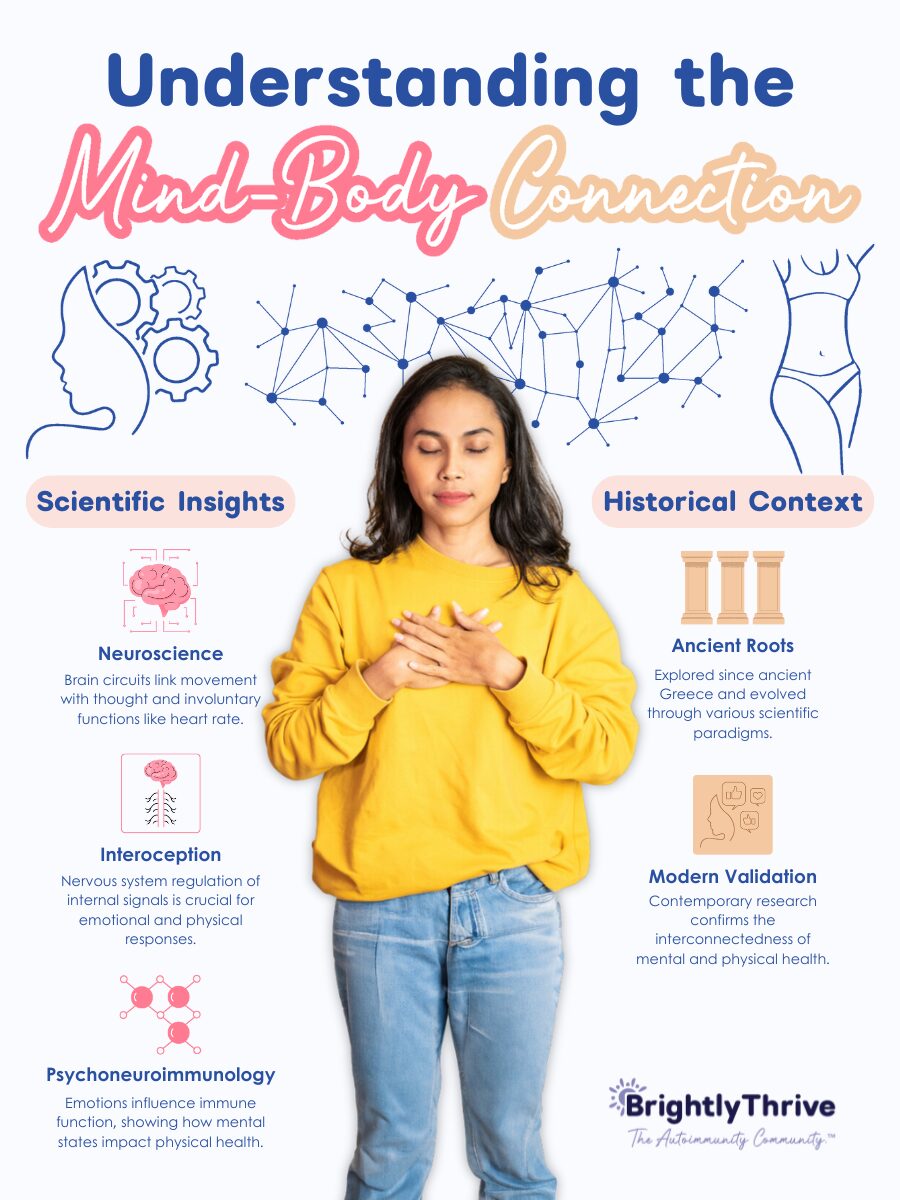
Mind Over Matter: 3 Simple Ways to Strengthen Your Mind-Body Connection
We often overlook the mind-body connection, but it’s the missing link in managing chronic illness. Ever notice how stress triggers your worst symptoms—racing heart, tense muscles, and crushing fatigue? It’s proof that mindset is as critical as medication.
If we can trigger symptoms with our thoughts and emotions, imagine the healing power we could harness by intentionally cultivating a calm, positive mental state.
Think back to moments when you felt calm and clear—like after gentle yoga, a mindful walk, or a simple deep-breathing exercise. That light, refreshed feeling isn’t just coincidence; it’s your mind and body in harmony, working together to restore balance. These moments are powerful reminders of the mind-body connection in action, where our mental and emotional states directly influence our physical well-being.
This connection is so ingrained in our daily lives that it even sneaks into our everyday language. Ever caught yourself saying, “I’ve got butterflies in my stomach,” “I’m carrying the weight of the world on my shoulders,” or “I have a gut feeling”?
These phrases aren’t just metaphors—they reflect the real, physical impact of our thoughts and emotions. They highlight that our mental and physical health are not separate but deeply intertwined, two sides of the same coin that can either work together or against each other.
Recognizing and embracing this connection is not just some feel-good advice; it’s a call to rethink how we approach chronic illness. It’s about empowering ourselves with the understanding that our mindset, stress levels, and emotional health play an undeniable role in how our bodies respond and heal.
The Science and Art of the Mind-Body Connection
The mind-body connection is a well-documented field, emphasizing the deep interrelationship between mental and physical health.

In essence, the mind-body connection is key to understanding the interplay between mental and physical health, with practical benefits for holistic well-being.
Why It’s Important
Understanding and nurturing this mind-body connection is crucial, especially when it comes to our overall health and autoimmune well-being. When we’re stressed, for instance, our bodies release cortisol, a hormone that, in small doses, can be helpful. But when stress is chronic, elevated cortisol levels can weaken the immune system, making us more susceptible to illness and potentially triggering autoimmune responses. On the flip side, positive mental states, like relaxation and happiness, can boost immune function and improve our body’s ability to fend off disease.
However, when the mind-body connection is ignored, it can lead to a range of issues. Chronic stress, poor sleep, and lack of self-awareness can exacerbate autoimmune conditions, leading to flare-ups, fatigue, and other health problems.
But the good news is that there are ways to maximize this connection for better health. Simple practices like mindfulness, regular physical activity, and meditation can help bring the mind and body into harmony.
3 Helpful Ways to Strengthen Your Mind-Body Connection
Living with an autoimmune condition often means dealing with chronic stress, which can exacerbate symptoms and impact overall well-being. Strengthening the mind-body connection is a powerful way to manage this stress, leading to improved health outcomes. Here are three effective strategies to help you build a stronger mind-body connection, tailored to support your autoimmune health.
1. Focused Mindfulness Practices
Mindfulness can help you become more present, allowing you to better manage stress and respond to your body’s needs.
- Mindfulness Meditation: Focus on your breath or a mantra to cultivate deep awareness. This practice can reduce stress, improve emotional regulation, and bring calm to both mind and body.
- Pro Tip: Incorporate Music into Meditation
- Mindful Listening: Focus on different elements of music—rhythm, melody, pauses—to anchor your attention during meditation.
- Background Music: Use calming, lyric-free music during meditation to block distractions and deepen your practice. Check out this playlist for starters.
- Pro Tip: Incorporate Music into Meditation
- Body Scan Meditation: Conduct a mental scan of your body, noticing sensations without judgment. This practice enhances self-awareness and relaxation, crucial for managing autoimmune symptoms.
- Pro Tip: Create a calm environment for your Body Scan Meditation, moving slowly through each part of your body with non-judgmental awareness.
- Breathe deeply, directing your breath into tense, aching spots—your stiff neck, clenched jaw, or heavy chest. Visualize each inhale as warm, healing light softening pain, and each exhale as a release, pushing out tension.
- See healing energy flow like a gentle river, calming inflammation and easing fatigue. This isn’t just relaxation; it’s retraining your body’s response to stress, helping manage symptoms like joint pain, brain fog, and deep exhaustion. With each breath, you reclaim a bit of control, turning breathwork into a powerful self-healing ritual.
- Pro Tip: Create a calm environment for your Body Scan Meditation, moving slowly through each part of your body with non-judgmental awareness.
2. Intentional Physical Practices
Physical activities like yoga and Tai Chi go beyond simple movement—they’re about cultivating mindfulness, focus, and inner calm. When practiced with intention, these exercises enhance the mind-body connection, reducing stress and lowering cortisol levels, which can help ease inflammation and flare-ups.
Yoga’s gentle stretches can improve joint flexibility, reduce muscle stiffness, and boost circulation, while Tai Chi’s slow, deliberate movements enhance balance, coordination, and mental clarity. Together, these practices can promote better sleep, elevate mood, and support overall autoimmune health, empowering you to manage symptoms with more resilience and ease.
3. Breathwork and Visualization
Breathwork and visualization are powerful tools that can directly influence the mind-body connection, helping to manage stress and promote relaxation. Practicing these techniques with deep focus can lead to a state of flow, where stress melts away, and your body finds balance.
- Breathwork: Techniques like diaphragmatic breathing or box breathing can calm the mind and energize the body. These methods promote relaxation, reduce stress, and help regulate emotions, all of which are beneficial for those dealing with autoimmune conditions.
- Pro Tip: Boost your breathwork experience by 5% with a cozy space, calming visualization, gentle movement, a daily routine, and a touch of aromatherapy.
- These small tweaks make relaxation more enjoyable and effective, perfect for managing stress and autoimmune symptoms.
- Visualization: Engaging in focused visualization exercises can create a deep sense of relaxation. Imagine peaceful scenes or positive outcomes, and let this mental imagery reduce stress and demonstrate the power of your mind-body connection.
- Pro Tip: Enhance your visualization practice by imagining peaceful scenes or positive outcomes to deeply relax and strengthen your mind-body connection.

Final Thoughts
The mind-body connection is a powerful force that influences our physical and mental well-being, particularly when managing autoimmune conditions. By embracing practices such as mindfulness, intentional physical activities, and breathwork, we can harmonize our mind and body, reduce stress, and improve our overall health. Understanding and nurturing this connection empowers us to take control of our well-being, leading to a more balanced and resilient life. So, how connected have you been with your mind and body lately?
References
Tang, Y. Y., Jiang, C., & Tang, R. (2017). How Mind-Body Practice Works—Integration or Separation? Frontiers in Psychology, 8. https://doi.org/10.3389/fpsyg.2017.00866
Psychologist, J. S. B. (2024, June 26). Exploring the Body Mind Connection (Incl. 5 Techniques). PositivePsychology.com. https://positivepsychology.com/body-mind-integration-attention-training/
Gray, R. (2020b, December 8). Mind Body Exercises | The Best Mind Body Connection Exercises [From A Therapist] — Robyn Gray Counseling, LMFT & RYT. Robyn Gray Counseling, LMFT & RYT. https://www.robyngraycounseling.com/blog/mind-body-exercises
Mind-body connection: what is it and how to strengthen it — Calm Blog. (2024, March 6). Calm Blog. https://www.calm.com/blog/mind-body-connection
Payne, K. (2023, November 27). 3 Powerful Ways to Strengthen the Mind-Body Connection. New Thinking. https://www.newthinking.com/health/3-powerful-ways-to-strengthen-the-mind-body-connection
Yıldırım, D., & Yıldız, C. I. (2022). The Effect of Mindfulness-Based Breathing and Music Therapy Practice on Nurses’ Stress, Work-Related Strain, and Psychological Well-being During the COVID-19 Pandemic. Holistic Nursing Practice, 36(3), 156–165. https://doi.org/10.1097/hnp.0000000000000511
Lesiuk, T. (2016). The Development of a Mindfulness-Based Music Therapy (MBMT) Program for Women Receiving Adjuvant Chemotherapy for Breast Cancer. Healthcare, 4(3), 53. https://doi.org/10.3390/healthcare4030053
Mapp, D. R. D. P. C. (2024b, August 1). Exploring the Mind–Body Connection Through Research. PositivePsychology.com. https://positivepsychology.com/mind-body-connection/
TAGS:
CATEGORIES:






